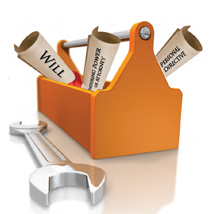 Deciding how to distribute what we own after we pass away and taking steps to see that our wishes will be carried out are definitely among those “shoulds” of life. So, too, is providing for the possibility of losing capacity to make decisions for ourselves. However, even for subjects like these that we might prefer to avoid or defer (but really ought not to), a little learning is often a good answer. It can help us get past that uninformed, intimidated space in which we’re often stuck before we’re ready to move ahead to take some actual steps.
Deciding how to distribute what we own after we pass away and taking steps to see that our wishes will be carried out are definitely among those “shoulds” of life. So, too, is providing for the possibility of losing capacity to make decisions for ourselves. However, even for subjects like these that we might prefer to avoid or defer (but really ought not to), a little learning is often a good answer. It can help us get past that uninformed, intimidated space in which we’re often stuck before we’re ready to move ahead to take some actual steps.
Lethbridge College’s Public Legal Education program has a presentation for just this kind of situation. It’s called An Enduring Power of Attorney; A Personal Directive; A Will - A Legal Toolkit. It will give you some basic familiarity with these three documents and their requirements.
For instance, you’ll learn about the responsibilities of a personal representative under a will, and that in a will you can set out what happens to your property after death, but that there are certain types of property a will does not cover. The other two documents can help you address those potential capacity issues. You can appoint an agent in a personal directive to make personal decisions for you if you are unable to, and an attorney in an enduring power of attorney to make your financial decisions if you become incapable.
Now, you could ignore the whole thing. If you don’t make a valid will, you actually do have one anyway, by default. Alberta intestacy law sets out rules for what happens to the property of people who die without a will; that may be all you want or need. However, it may not. For example, you may want to give property to somebody not listed in this law, or set up special arrangements for young children.
Likewise, if you become unable to make your own decisions, and don’t have a personal directive or enduring power of attorney, someone can apply to the court for an order appointing a person to make those decisions for you.
However, that procedure is more cumbersome and quite likely more expensive than having the documents in place, and the decision about who to appoint could be, depending on circumstances, no longer yours.
You should be aware that public legal education is general education and information only and no substitute for obtaining legal advice. For someone to sit down to give you legal advice specific to your situation, and to prepare the documents for you, you need to see a lawyer.
Legal Toolkit presentations are available from the Public Legal Education program either as evening programming at Lethbridge College, or at Law at Lunch at the Lethbridge Public Library. If you can’t attend either of those venues, video conference delivers the presentations to sites in many areas of Alberta.
For more information on wills and other legal situations, check the Public Legal Education program section in Lethbridge College’s Mind Body Home course catalogue or lethbridgecollege.ca/go/MBH


